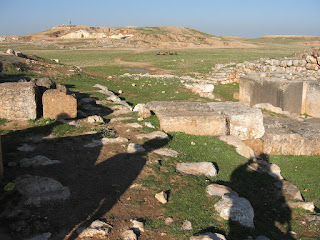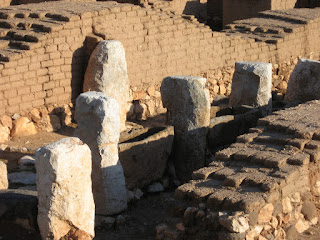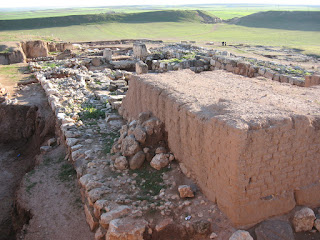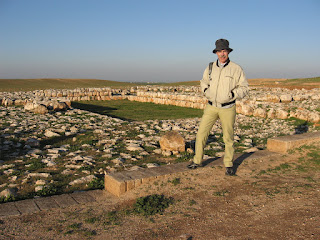Ebla (Sumerian: 𒌈𒆷 eb₂-la, Arabic: إبلا, modern: تل مرديخ, Tell Mardikh) was one of the earliest kingdoms in Syria. Its remains constitute a tell located about 55 km (34 mi) southwest of Aleppo near the village of Mardikh. Ebla was an important center throughout the 3rd millennium BC and in the first half of the 2nd millennium BC. Its discovery proved the Levant was a center of ancient, centralized civilization equal to Egypt and Mesopotamia and ruled out the view that the latter two were the only important centers in the Near East during the Early Bronze Age. The first Eblaite kingdom has been described as the first recorded world power.
Ebla maintained its prosperity through a vast trading network. Artifacts from Sumer, Cyprus, Egypt and as far as Afghanistan were recovered from the city's palaces. The kingdom had its own language, Eblaite, and the political organization of Ebla had features different from the Sumerian model. Women enjoyed a special status, and the queen had major influence in the state and religious affairs. The pantheon of gods was mainly north Semitic and included deities exclusive to Ebla. The city was excavated starting in 1964 and became famous for the Ebla tablets, an archive of about 20,000 cuneiform tablets found there, dated to around 2350 BC. Written in both Sumerian and Eblaite and using the cuneiform, the archive has allowed a better understanding of the Sumerian language and provided important information over the political organization and social customs of the mid-3rd millennium BC's Levant.
Source: Ebla - Wikipedia
Ebla maintained its prosperity through a vast trading network. Artifacts from Sumer, Cyprus, Egypt and as far as Afghanistan were recovered from the city's palaces. The kingdom had its own language, Eblaite, and the political organization of Ebla had features different from the Sumerian model. Women enjoyed a special status, and the queen had major influence in the state and religious affairs. The pantheon of gods was mainly north Semitic and included deities exclusive to Ebla. The city was excavated starting in 1964 and became famous for the Ebla tablets, an archive of about 20,000 cuneiform tablets found there, dated to around 2350 BC. Written in both Sumerian and Eblaite and using the cuneiform, the archive has allowed a better understanding of the Sumerian language and provided important information over the political organization and social customs of the mid-3rd millennium BC's Levant.
⚠ Alert
As a result of the Syrian Civil War, many tunnels were dug and a crypt full of human remains was discovered; the remains were scattered and discarded by the robbers, who hoped to find jewelry and other precious artifacts. Besides excavations by rebels, nearby villagers also began digging at the site with the aim of finding and looting artifacts.
As a result of the Syrian Civil War, many tunnels were dug and a crypt full of human remains was discovered; the remains were scattered and discarded by the robbers, who hoped to find jewelry and other precious artifacts. Besides excavations by rebels, nearby villagers also began digging at the site with the aim of finding and looting artifacts.
Source: Ebla - Wikipedia










































